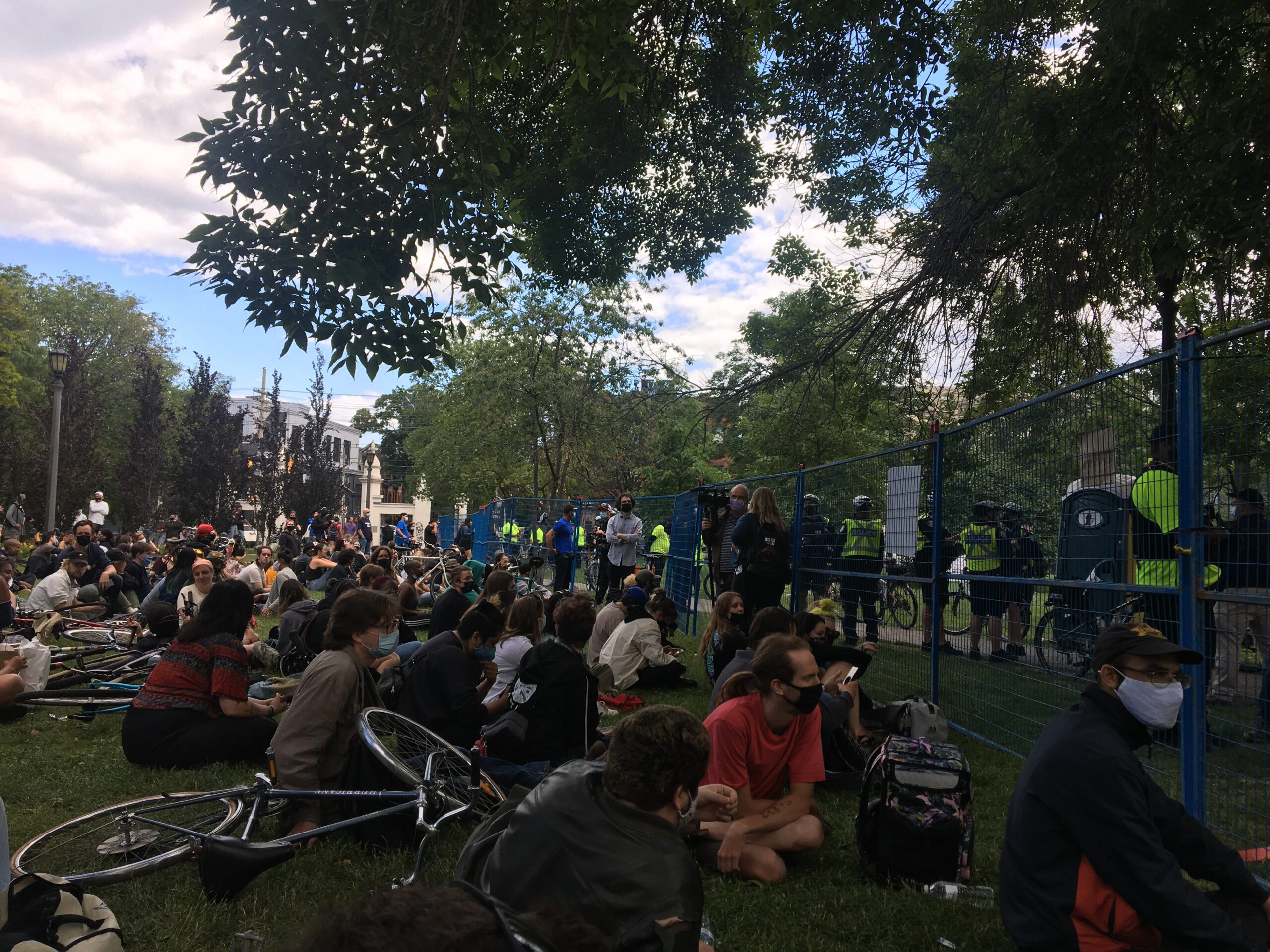The park where I once played soccer is now the space where I flushed pepper spray out of burning eyes while dodging horse hooves and police kettling. After the city’s brutal June 22 eviction of some two dozen unhoused people tenting in Trinity Bellwoods park, it has become the memorial site of the city’s naiveté. “Toronto The Good,” (if it ever was) is no more.
One month before the pandemic hit, I helped a newly unemployed congregant find a shelter bed. I remember him telling me that he found the shelter’s high-volume drug use disturbing. He struggled to keep his composure whenever other residents went into mental health crises. He felt abandoned when the pandemic forced social workers to work from home.
More on Broadview:
- Project to build tiny homes for Toronto’s homeless under threat
- How churches are coming together to tackle rural homelessness
- UN watchdog shocked by homelessness in Canada
Six months into his stay at the shelter, he called me in tears. “Reverend, I have to get out of here,” I recall him saying. “This place isn’t good for the soul.” He lived on the hope of finding safe affordable housing for another month before he died by suicide. I helped his 11-year-old son choose what to put in the casket.
Those tenting in Trinity Bellwoods are survivors of our collective neglect. More than 79,000 people are on Toronto’s social housing waitlist. Some park residents have told me that they prefer to stay in communities that look out for one another, close to support and harm-reduction workers they trust. CTV News reported that violent incidents in the shelter system have gone up 200 per cent in the past five years. A Canadian Medical Association Journal study found that those recently homeless were more than 20 times more likely to be hospitalized with COVID than the rest of the population — and shelters aren’t helping.

The city says their hands are tied, but council could repeal the bylaw about camping in parks. Instead, more than a week ago in Trinity Bellwoods, numerous police on horseback, bike, and foot were deployed, backed by private security forces, supported by rooftop surveillance, drones, temporary fencing, and riot gear in the park.
Despite the brute force, several park residents still said “no” to the city’s inadequate offer of temporary housing.
The trauma of the day left its mark on us all. I can still see the horse hooves coming in my direction as I frantically flushed water into a stranger’s burning eyes. For those who once felt safest living in the open-air park, it now feels safer to live in tucked-away places, where even support workers with hot meals are having a hard time finding them.

Ad hoc volunteer-run community groups like the Encampment Support Network and advocacy groups like the Shelter & Housing Justice Network hope more people will sign up and show up. You can find the action items on their websites. With more military-style evictions predicted for the Moss Park, Parkdale, and Cherry Beach encampments, it has been heartening to see so many neighbours turning up to support the unhoused and putting pressure on all levels of government to expedite the plans for long-term housing and social supports.
Though we saw our leaders act in the cruelest way possible, the hundreds of supporters who gathered at Trinity Bellwoods reminded me that this city is kinder than we give it credit for. Maybe we can’t live up to “Toronto, The Good,” just yet, but I’ll throw my lot in with those insisting on “Toronto, The Better.”
***
Rev. Alexa Gilmour is the minister at Windermere United in Toronto. She is the founder of the Stone Soup Network and a member of the Canadian Sanctuary Network and Faith in the City.
















The park where I once played soccer is now the space where I flushed pepper spray out of burning eyes while dodging horse hooves and police kettling.
You forgot the smell of urine, feces and drugs.
You forgot the noise until 1-2 am.
You forgot they prefer to stay in communities that look out for one another, or in other words “a gang”.
You forgot that this is a deliberate rebellion against authority (whether you agree with it or not).
Yes homelessness is a problem, it is not a “city” problem, it is a societal problem.
No matter what the city does, it won’t satisfy everyone. Using emotional issues of the minority doesn’t excuse the vast majority of what they are doing.
The military style of evictions is in response to previous “civilized” attempts to evict in the past.
Other newspaper reports do not support your assertion of city cruelty. For instance you failed to mention that by the end of the day, 14 of the two dozen people living in the park agreed to accept the cities offer of shelter. And the city was negotiating with the others. You failed to mention that there were three protesters arrested and but no residents living in tents. You failed to explain all of the safety issues (fires, criminality, ect) that the city could no longer ignore after a year. You failed to mention that the city was spending over 600 million on attempting to mitigate the homeless situation in Toronto which is more than double the amount spent just before the pandemic began. You failed to mention the protesters refused to let the city workers talk to the individuals about alternative accommodations. I had to read about five other news sources to get a balanced picture. My concern is that your writing cannot be trusted to help the reader get a balanced sense of the issue you address. You insert yourself in the story in dramatic fashion. You did the same thing last year when you wrote about your participation in the El Paso protests on the US border issue last year. Your assessment of US policy reflected a complete lack of the complexities of US immigration policy.